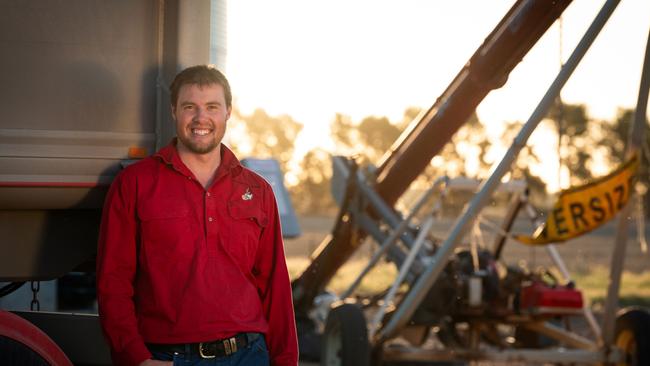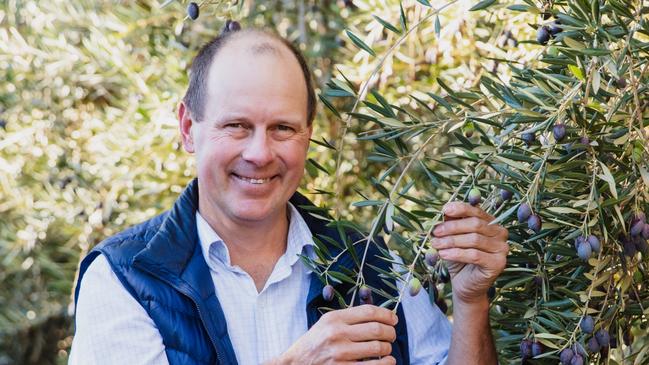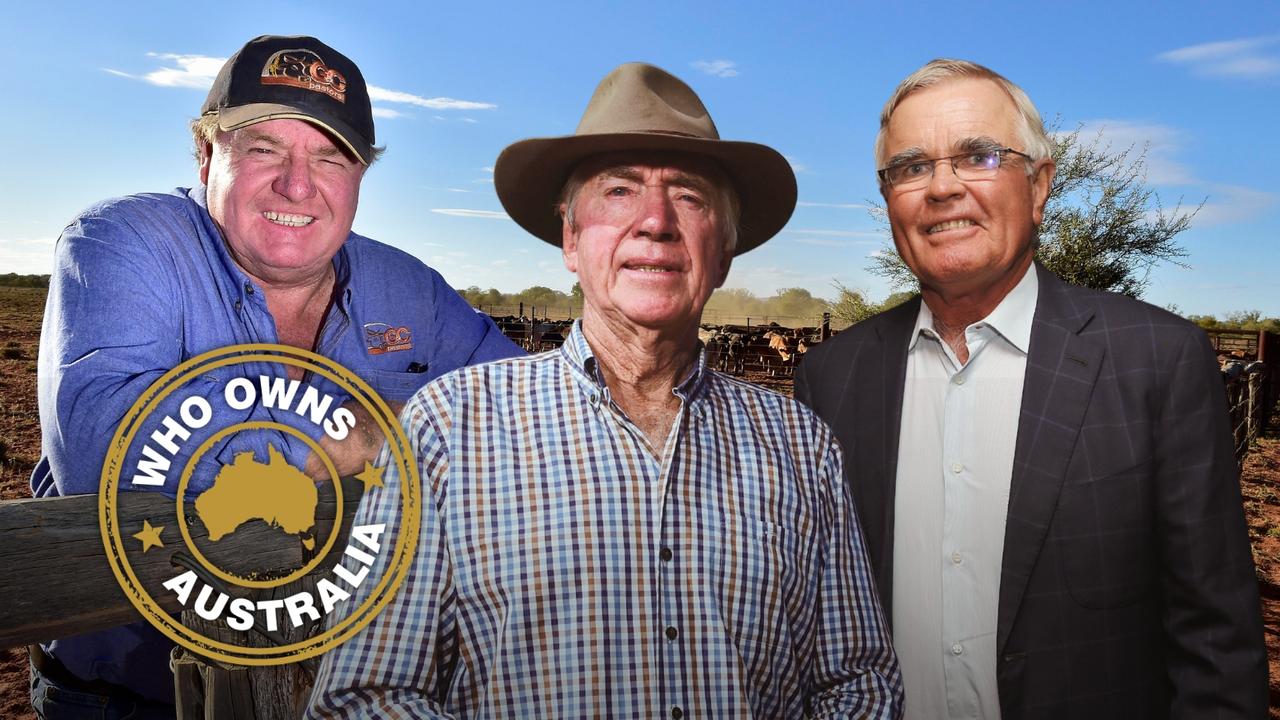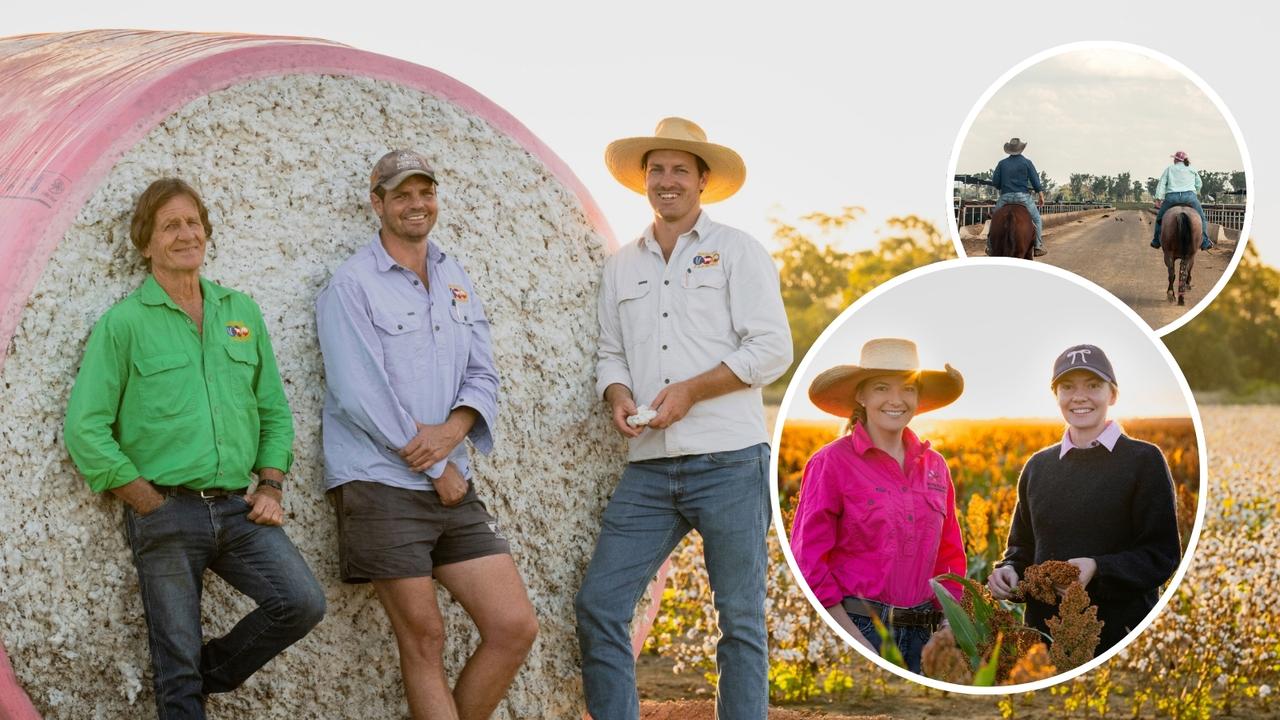Broden Holland, Hylo Ag, OpenWeedLocator: 20-somethings discover farming makes money and positive change
The number of 25-34-year-olds working in agriculture is surging, as young people discover how the sector can create wealth.
Australian agriculture is on a golden run, and it’s having a halo effect.
Three years of stellar cropping seasons, decent dairy farmgate returns, strong global demand for Aussie beef and lamb and an incredibly buoyant rural property market have generated plenty of positivity.
But that’s not the only reason more young people are flocking to the industry.
Bright, ambitious 20-somethings, such as grain grower Broden Holland, are excited by the possibilities of a data-driven ag revolution that’s been building for more than a decade. Digital technology has allowed farmers to work “smarter, not harder” to make big leaps in productivity, profitability and sustainability.
“There is no doubt the previous generations had it way harder than us physically and mentally,” says 29-year-old Holland, who has championed the use of new technology – from soil-moisture sensors to social media networking – since returning to his NSW family farm at Young in 2016.

He works alongside his father, Chris, growing wheat, canola, faba beans, lucerne and sheep across 5000 hectares.
“My dad has worked way harder than me, and so has my pop. Today (young farmers) are not physically working harder, but our brains are probably ticking over a lot more,” says Holland, who has achieved awesome yield improvements using rainfall and moisture data to finetune fertiliser use and weed control with precision tools. Holland has been recognised for his efforts as a cropping category finalist in The Weekly Times Coles 2023 Farmer of the Year awards.
“It is a credit to the industry. We are making the jobs easier, and we are doing way more hectares and operations with the time we’ve got than what we would have.”
This new-found efficiency is contributing to ag’s appeal, as an exciting career path where young people can help feed the world and improve soil and environmental health, while – importantly – earning decent money for their effort.
“There is no doubt that technology is changing the game,” Holland says. “That is probably part of what is making the younger generation look at coming back (to the farm) earlier.”
SURGE IN 25-34-YEAR-OLD WORKFORCE
Headlines have screamed warnings for years about Australia’s “ageing farmers”, with the median age of primary producers climbing since the 1980s. Beef producers are now the oldest, with a median of 62, according to the latest data from the Australian Bureau of Statistics. But the agricultural workforce median age of 51 years has been fairly steady since 2016, and there is more good news hiding in the data detail.
Closer analysis shows more than 127,000 people classed themselves as “farmers” at the 2021 census, with nearly 29 per cent aged 65-plus. Taking into account all occupations along the agriculture supply chain, however, the 25-34-year-old demographic swells to more than 67,000 workers, or 20.4 per cent of a 330,000-plus workforce.
In 2011, ABS figures showed just 21 per cent of ag’s workforce was younger than 35. By 2016, that had grown to 24 per cent. In 2021 it hit about 30 per cent, analysis shows.
Youth are bolstering the industry across roles as farmers, farm workers, ag service providers and in processing.

And they are coming from different backgrounds and bringing new skills, says Marcus Oldham College principal Andrew Baker, who has been at the helm of the leading agribusiness college in Geelong since 2021. Baker has witnessed an enrolment surge that shows no sign of slowing.
“There has been, in the past 10 years, a real trend in students coming to Marcus who are not from farming families,” Baker says. “They are coming from cities and regional towns as opposed to farms. Also, our agribusiness course this year has a greater cohort of females in it than males, which is the first time we’ve seen that.
“Our students are getting a 100 per cent employment rate after leaving Marcus. We’ve had career days here and had to turn employers away because we can’t fit them in, that shows how desperate people are for employees, especially for skilled graduates.”
NEW RECRUITS
City-to-country convert Natalie Bell has set her sights on a career in ag. Originally from Sydney, 27-year-old Bell had her first taste of agriculture in high school, as part of the Oakhill College cattle show team. “That’s what made me fall in love with livestock,” Bell says. “I was also really inspired by being told that the jobs we would have hadn’t been created yet.”

Bell completed an ag science degree at Sydney University, before leaving the big smoke for Toowoomba. Now she’s living on a sheep property at Holbrook, working as a business analyst for Cunningham Cattle Co, and is also branching out with her own entrepreneurial agtech start-up.
Early last year she founded Hylo Ag, which is pioneering a recycling service for plastic livestock ear tags to help solve the farming sector’s big on-farm plastic waste problem.
She came up with the idea in her previous role as an account manager for the pork industry. “I was dealing with major supermarkets who were very keen to demonstrate to customers that they work with sustainable suppliers,” Bell says. “It was getting quite complex to generate long-term and ambitious plans quickly, so I thought I could find something that was easy to do tomorrow … and that livestock producers could jump on quickly.”
Working with Geelong recycling firm Ritchie Technology, Hylo Ag’s service plans to record consignments of waste ear tags that suppliers and processors send directly to the recycling centre. The tech is currently in a proof-of-concept phase.
“We keep track of the amount of plastic that is diverted from landfill. It puts a value on your effort, which hasn’t been done before,” she says.

Perth’s Guy Coleman was also an “ag kid” at school; obsessed by tractors, dirt and crops. He got his fix on his dad’s 1000-hectare “hobby” farm at Esperance on weekends.
“But I never realised (ag) could be a career,” says the 29-year-old, who has become an expert in weed tech, studying a PhD at University of Sydney and University of Copenhagen.
“I had plans to be a medical doctor,” he says. “I was doing medicine because I wanted to help people. But in ag, I hadn’t realised you could have huge impact across communities, environments and producing food.”
So in 2016, he opted for an ag science degree instead of medicine. “Turns out it was quite interesting,” says Coleman, whose PhD research focuses on the constraints and opportunities of current weed-detection technology.
As part of his project, Coleman has created an open-source software platform called OpenWeedLocator that allows farmers to build a simple, affordable computerised controller, similar to global manufacturers’ spot-spraying tech. It can be hooked up to a sprayer or tractor, to activate tools as a scanner detects green weeds in fallow paddocks.
“It is about trying to give people access to this quite expensive out-of-reach technology,” Coleman says.

Broden Holland says, unlike city kids Bell and Coleman, he knew from a young age that his future lay in agribusiness. But his school experience was completely different to theirs.
“School didn’t push (ag) at all,” he says. “We were going through the drought. There was that mentality of ‘poor farmers’.” That mentality, he says, combined with a common farming-family insistence that children gain experience in another job or industry for five or 10 years before returning home may have contributed to the current “ageing” farmer.
“I think the younger generations are coming back, but it worries me how much there is to learn and do, and it is changing so rapidly,” Holland says. “And I wonder whether coming back late, if you can catch up and keep up.”

Agribusiness heavyweight Rob McGavin, who is co-founder and chair of Cobram Estate Olives Ltd, says tough conditions at the end of the 20th century might have warned many away from the industry, but the dial has shifted dramatically.
“Ag went through a really tough period after the wool crash (of the late 1990s). A lot of people thought ‘oh, I’ll do better if I get a job in the city or do something else’, but I never thought that way,” says McGavin, who attended Marcus Oldham himself, graduating in 1993, and is now chairman and director of the college’s council.
“There were a lot of people leaving ag who were disillusioned with it. Personally, I think the vast majority of those who stuck with agriculture would have done better than their counterparts in the city.
“It’s terrific how many young people are coming into ag, but I don’t think we could have too many. If applications at Marcus Oldham are any measure of how much interest there is an ag, it’s really bright.”




